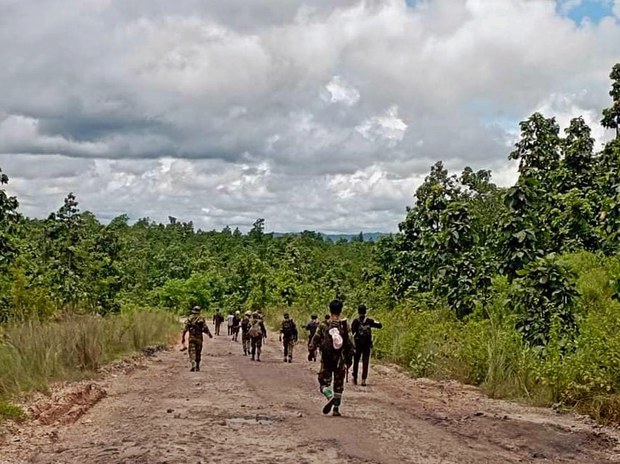Hong Kong police say cartoonist’s art damages their image
Hong Kong police have expressed “strong concerns” to the city’s Ming Pao newspaper over what a spokesman called a “misleading” cartoon by political satirist Zun Zi that lampooned authoritarian education policies, media in the city reported. Zun Zi’s cartoon, published on Tuesday, shows a police officer fully-clad in riot gear at a school asking “What have the students done today, headteacher Chan?” The teacher lists the students’ various offenses including losing erasers and talking back to teachers. The cartoon was published in the wake of A widely-publicized case in which 14 secondary school students were suspended for three days for failing to show up to a flag-raising ceremony at St Francis Xavier’s School in Tsuen Wan district. Under a national security law imposed by Beijing in mid-2020, authorities in Hong Kong have conducted a wide-ranging crackdown on pro-democracy activists, many of whom are students at universities and other educational institutions. Students are among the dozens of activists arrested, campus activism has been banned, and schools are under pressure to adjust their curriculum to inculcate nationalism and fealty to the ruling Chinese Communist Party. Zun Zi’s cartoon could give readers the misleading impression that Hong Kong police would be deployed to handle small campus issues, police spokesman Joe Chan wrote to Lau Chung Yeung, Ming Pao’s executive chief editor, reports in the city said. “The false descriptions in [the cartoon] might make the public misunderstand police work. They not only damage the Force’s image, but also harm the cooperation between the police and the public, as well as our effectiveness on cracking down crimes,” said Chan’s letter, quoted in the Hong Kong Free Press. The cartoon remained on Ming Pao’s website on Wednesday, while Ming Pao’s editorial board issued a statement saying that the paper would “continue to provide accurate and credible news content to readers in a professional spirit and support columnists in providing professional work.” Hong Kong has plummeted in global press freedom rankings following a citywide crackdown on dissent under the national security law. Speaking to RFA Cantonese when Hong Kong’s national security law was first enacted in 2020, Zun Zi said that the local Hong Kong government cooperated with Beijing to pass the national security law, which had a chilling effect on society. “Now we have to be careful when we laugh. We need to be skillful when laughing. We can’t draw fists or point fingers everyday,” he said. “Only when you integrate politics, incidents, with people’s life stories and the culture of the society, can you create top-rated and inspiring works of art,” Zun Zi said, vowing to keep drawing despite the crackdown. “As to when is the time to stop, if someone holds a knife, and puts my hand on the chopping board and tells me that he will cut off my hand if I continue to draw. If this happens, I will stop. This is the only way (to stop me).” Zun Zi is the pen name of Wong Kee-kwan, a 40-year veteran cartoonist who initially contributed to the pro-Beijing New Evening Post and Takungpao publications before moving to Ming Pao. His cartoons have also appeared in the pro-democracy Apple Daily, which has been shut down by national security police since the passage of Hong Kong’s national security law. At least three Hong Kong cartoonists who published their work in Ming Pao, Hong Kong Worker, vawongsir and Ah To, have announced their plans to leave the city amid the crackdown. Translated by RFA Mandarin. Written by Nawar Nemeh.






